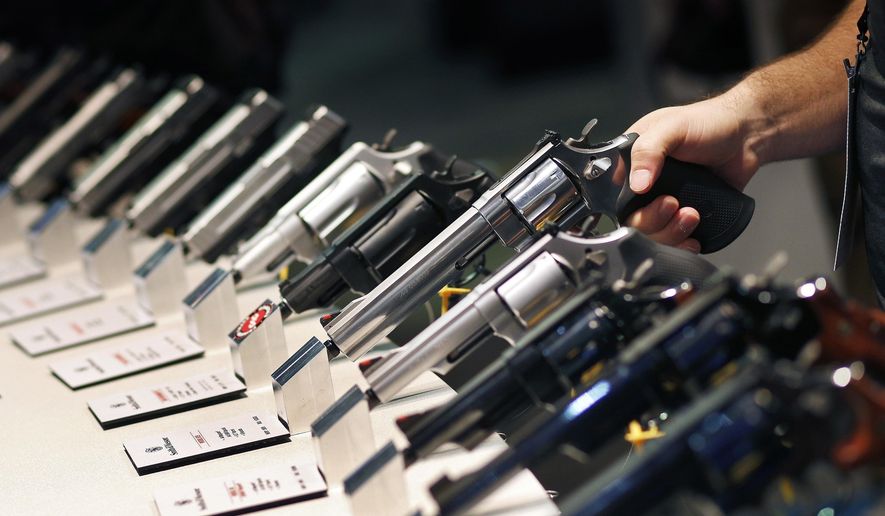House Democrats on Thursday launched the first salvo in what will be an intense battle over Second Amendment rights, passing two bills that would mark the most significant legislative action on gun control in 25 years if they can pass the Senate.
The legislation would impose stricter background checks on all commercial gun sales and transfers, give the FBI more time to conduct background checks, and close loopholes that enable a person to acquire a gun before the background check is complete.
“If Republicans stand in the way, they will pay a price both morally and politically,” said House Judiciary Committee Chairman Jerrold Nadler, New York Democrat.
Emboldened by their newly won control of the White House and both chambers of Congress, Democrats are reviving gun-control measures that have sat on the shelf for years.
Other proposals in the pipeline include:
• Banning the AR-15, a tactical rifle they label an assault weapon.
• Banning large-capacity rifle magazines that hold more than 10 bullets.
• Enacting “red flag laws” that allow family members or law enforcement to petition a judge to temporarily remove a gun from a person deemed to be a risk to themselves or others.
• Repealing legislation that protects gun dealers from being sued if they sell a firearm to someone who commits a crime.
To enact their gun control wish list, they face a high hurdle in the Senate.
Most legislation requires 60 votes to advance in the Senate. The chamber is split 50-50 with Democrats in control because Vice President Kamala Harris is the tie-breaking vote. Democrats would need 10 Republicans to keep a gun-control bill alive.
The bills that passed the House on Thursday also cleared the Democrat-run lower chamber in 2019. The bills failed to make it to the floor of the Senate, which was under Republican control at the time.
This time, Senate Majority Leader Charles E. Schumer vowed the measures will receive a vote in the upper chamber.
“They will be on the floor of the Senate and we will see where everyone stands,” the New York Democrat said. “A vote is needed, not thoughts and prayers.”
The first bill, the Bipartisan Background Checks Act of 2021, would require background checks for all firearm sales or transfers in the country. Background checks currently are not required for sales or transfers by unlicensed or private sellers.
The measure passed in 227-203, with only eight Republicans voting in favor. Three Republicans — Fred Upton of Michigan, Chris Smith of New Jersey and Brian Fitzpatrick of Pennsylvania — all crossed the aisle and cosponsored the bill.
A second bill, the Enhanced Background Checks Act of 2021, would close the so-called “Charleston loophole” that allows gun sales to go through after three days if the background has not been completed.
The loophole got the nickname from the 2015 massacre of nine Black worshippers at a church in Charleston, South Carolina. The shooter, White supremacist Dylann Roof, was prohibited from buying a firearm because of a drug arrest but still got the .45 Glock pistol when the background check took too long.
The bill also would expand the background check review period to 10 days from three.
The bill passed in a 219-210 vote, with two Republicans supporting it.
House Speaker Nancy Pelosi, California Democrat, assailed Republicans for not supporting the bills.
“It challenges the conscience of Congress not to pass this legislation,” she said.
It’s not clear how much support the measures have among GOP senators.
House Minority Whip Steve Scalise, Louisiana Republican, urged members of his party to vote against the legislation. He said the enhanced background check would create “arbitrary delays” that infringe upon citizens’ Second Amendment rights.
Rep. Virginia Foxx, North Carolina Republican, blasted the bills in a fiery speech on the House floor: “These bills were created in bad faith. They are partisan shams that rob us of our freedoms.”
The National Rifle Association’s Institute for Legislative Action opposed both bills, arguing that they make it a crime to “simply hand a firearm to another person” and create exceptions that are “overly complicated and create many traps for unwary gun owners.”
If the measures pass the Senate, Mr. Biden likely would sign them into law. The White House Office of Management and Budget said in a statement this week that gun violence is a public health crisis.
“Every day, gun violence — community violence, domestic violence, suicides and mass shootings — takes American lives and forever alters many more,” the OMB said in a statement. “Last year, we saw record levels of homicides in cities throughout our country, violence that disproportionately impacts Black and Latino communities.”
• Jeff Mordock can be reached at jmordock@washingtontimes.com.




Please read our comment policy before commenting.